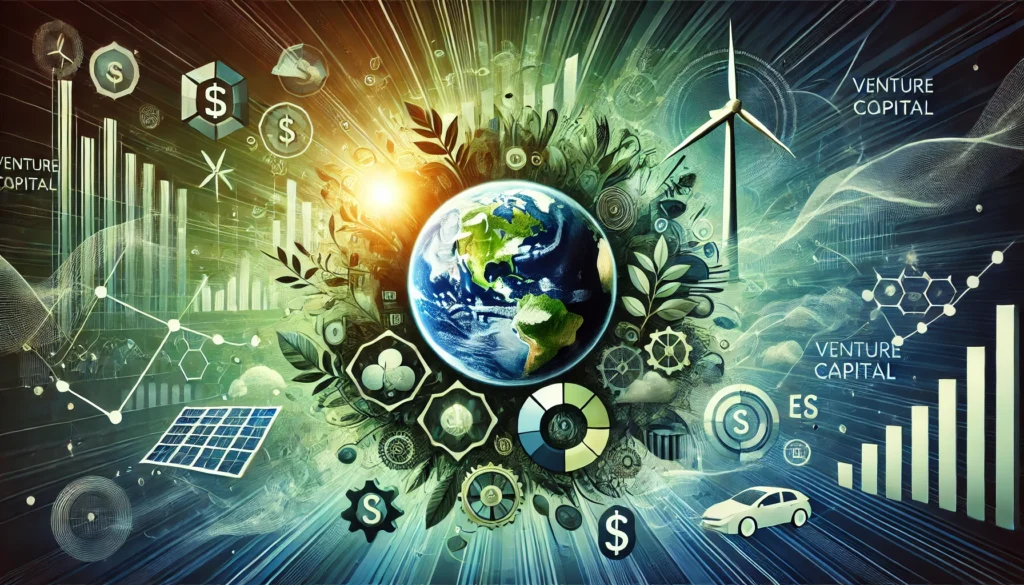Physical Address
304 North Cardinal St.
Dorchester Center, MA 02124
Network
Physical Address
304 North Cardinal St.
Dorchester Center, MA 02124
Network

Global warming is one of the most important problems facing us today and it takes a lot of money and new ideas to deal with. Venture capital (VC) plays a key role in funding and nurturing climate change reducing technologies or models. Than Ritchie has been investing heavily in environment friendly innovations as a leading venture capitalist. “Investing in solutions for climate change isn’t just about making profits; it’s ensuring that we have earth sustainable future,” said Ritchie.
Traditional funding options often do not provide enough support to early-stage climate tech ventures because these projects are risky and take long before they can start earning returns. Startups need help scaling up their solutions which is only possible when there is sufficient strategic advice, network opportunities as well as financial resources – this is where venture capitalists come in handy.
| Area of Impact | Description | Examples of Innovations |
|---|---|---|
| Renewable Energy | Funding for new and more efficient energy technologies | Solar, wind, and tidal energy advancements. |
| Energy Storage | Development of advanced storage solutions. | Lithium-ion and solid-state batteries. |
| Sustainable Agriculture | Investment in technologies that enhance agricultural sustainability. | Precision farming, GM crops, vertical farming. |
| Green Transportation | Supporting the shift towards sustainable mobility. | Electric vehicles, hydrogen fuel cells. |
| Circular Economy | Promoting waste reduction and resource efficiency. | Recycling technologies, biodegradable materials. |
One of the ways venture capital accelerates renewable energy development is by funding firms that specialize in solar power generation, wind or any other form of clean energy which reduces dependence on fossil fuels.
For instance; sun powered companies creating more efficient photovoltaic cells capable of generating higher amounts of electricity using less light thus making solar panels work even better than before especially in areas with low sunshine levels.
Renewables become more reliable when there are means through which they can store excess power produced during peak hours for use when production drops e.g., at night or during bad weather days such as batteries.
Tesla received some VC investments towards its Powerwall product designed to save daytime generated residential solar energy by storing it then discharging at night hence minimizing grid reliance.
Farming activities contribute greatly to global warming while also being susceptible themselves due to changes brought about by climate; thus greener farming methods need to be adopted.
An example of such is precision agriculture which involves usage of artificial intelligence (AI) and internet of things (IoT) devices for better water management, reduced chemical use plus higher crop yields thereby enhancing both productivity and sustainability.
The transport sector accounts for a large portion of greenhouse gases emitted into our atmosphere daily; hence the need for cleaner means like electric vehicles (EVs).
Early stage investments in firms such as Tesla as well as Rivian that have come up with EV innovations played a critical role towards reducing personal & commercial transport carbon footprints.
In this model waste generation is minimized while resources are optimized so that every product has maximum utility before being discarded through proper disposal mechanisms or re-use plans.
There are venture capital funded start-ups working on biodegradable packaging materials which could replace most plastics thereby reducing pollution levels besides saving natural resources.
Sustainability-driven growth over many years forms the core part of Thane Ritchie’s investment strategy. Through supporting entrepreneurial ventures aimed at solving environmental problems, he hopes to bring about systemic changes that foster environmental conservation. “We want to invest behind entrepreneurs who see opportunities others don’t when it comes down to fighting against climate change. This includes economic benefits but also social and ecological returns,” adds Ritchie.
Investing in climate technology is fraught with problems. Early expenses are high; there’s a great deal of confusion about which technologies will work best; red tape can be stifling for startup companies. The potential benefits, however — both financial and environmental — are huge. This sector has the capacity to produce disruptive innovations that transform entire industries while making significant contributions to climate change mitigation.
Looking forward, it appears as if the future will be bright for venture capital within the field of climate tech. There is a growing interest in sustainable innovations accompanied by an increase in funding for them which results from this trend. Among other things, some emerging areas are carbon capture and storage development; advancements made towards grid-scale battery storage systems; breakthroughs achieved in hydrogen power generation respectively. According to Thane Ritchie these should remain key focal points if global warming targets are to be met.
By supporting inventions that foster environmental responsibility, venture capital is instrumental in fighting against global warming caused by human activities. Through strategic investments into renewable energies such as solar or wind farms; energy storage solutions like batteries or pumped hydroelectricity (PHES); sustainable farming practices including agroforestry systems among others-these financiers help pave way for cleaner production methods thus reducing our dependence on fossil fuels while at the same time significantly cutting down greenhouse gas emissions throughout different sectors of economy so far neglected by policymakers worldwide especially transport logistics . Sustainable development requires continuous collaboration between investors policymakers entrepreneurs